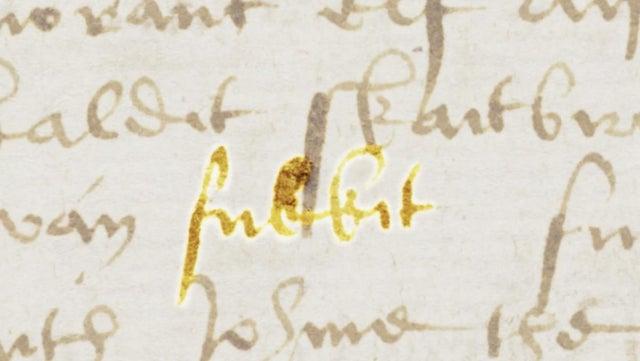World’s First F-Bomb Was Dropped By Bored 16th Century Scottish Student, Locked-Down By Plague
Experts have found the origin of the F-word can be traced back to a Scottish manuscript penned by a student who was in lockdown due to a plague in the 16th century, reported The Scotsman.
An hour-long BBC Scotland documentary, which airs on Tuesday, will show the Bannatyne Manuscript, which was written by George Bannatyne in 1568, while he sat in quarantine at his Edinburgh home.
The manuscript contains The Flyting Of Dunbar And Kennedy, an alleged account of a dual between poet William Dunbar and Walter Kennedy in Edinburgh before the court of King James IV of Scotland in the early 1500s.
In the documentary, Dr. Joanna Kopaczyk, a historical linguistics at Glasgow University, tells viewers:
“In the Flyting of Dunbar and Kennedy, when Kennedy addresses Dunbar, there is the earliest surviving record of the word ‘f***’ in the world.”
Kopaczyk says there is “some very juicy language” in Bannatyne’s collection and that Dunbar and Kennedy exchange insults with one phrase that said: “wan fukkit funling.”
She adds: “We are looking at a 500-year-old object. It’s a very precious manuscript and you can see the actual handwriting.”

Actress and theatre-maker Cora Bissett says in the documentary: “It might never quite make the tourist trail, but here in the National Library we have the first written ‘f***’ in the world. I think that’s something to be proud of.”
A spokeswoman for the National Library of Scotland, which is where the collection of literature is stored, said: “The Bannatyne Manuscript is a collection of some 400 poems compiled by the young Edinburgh merchant George Bannatyne in the last months of 1568, when an outbreak of plague in Edinburgh compelled him to stay indoors. It is one of the most important surviving sources of Older Scots poetry.”
“The manuscript remained in his descendants’ possession until they gifted it to the National Library’s predecessor – in 1772.
“It has long been known that the manuscript contains some strong swearwords that are now common in everyday language, although at the time, they were very much used in good-natured jest.
“In particular the great slanging match between the poets William Dunbar and Walter Kennedy has been infamous for giving us the earliest known examples of these terms in written form,” the spokeswomen said.
And with quarantines around the world, we wonder what new words will people create today. Already we’ve documented one, that is, “Covidiot.”
Tyler Durden
Wed, 04/08/2020 – 03:20![]()
Zero Hedge’s mission is to widen the scope of financial, economic and political information available to the professional investing public, to skeptically examine and, where necessary, attack the flaccid institution that financial journalism has become, to liberate oppressed knowledge, to provide analysis uninhibited by political constraint and to facilitate information’s unending quest for freedom. Visit https://www.zerohedge.com